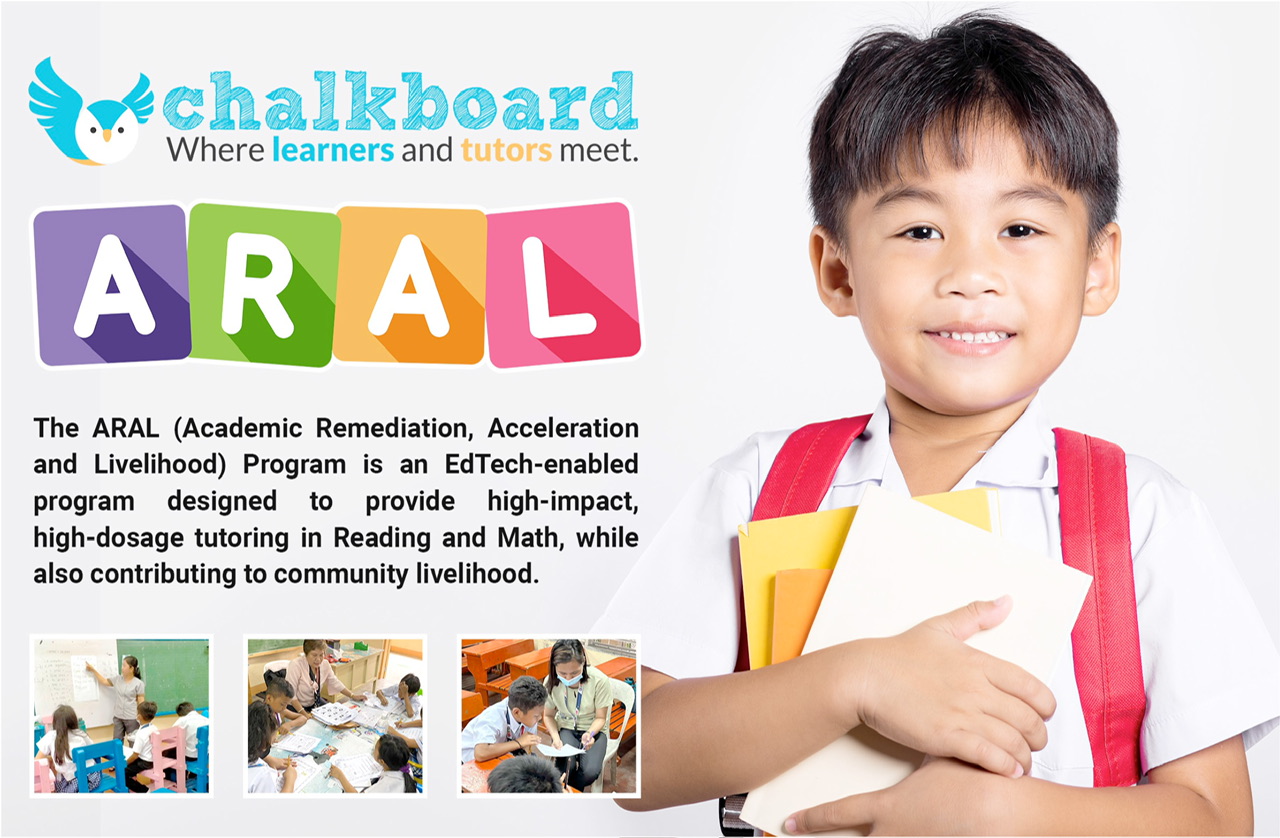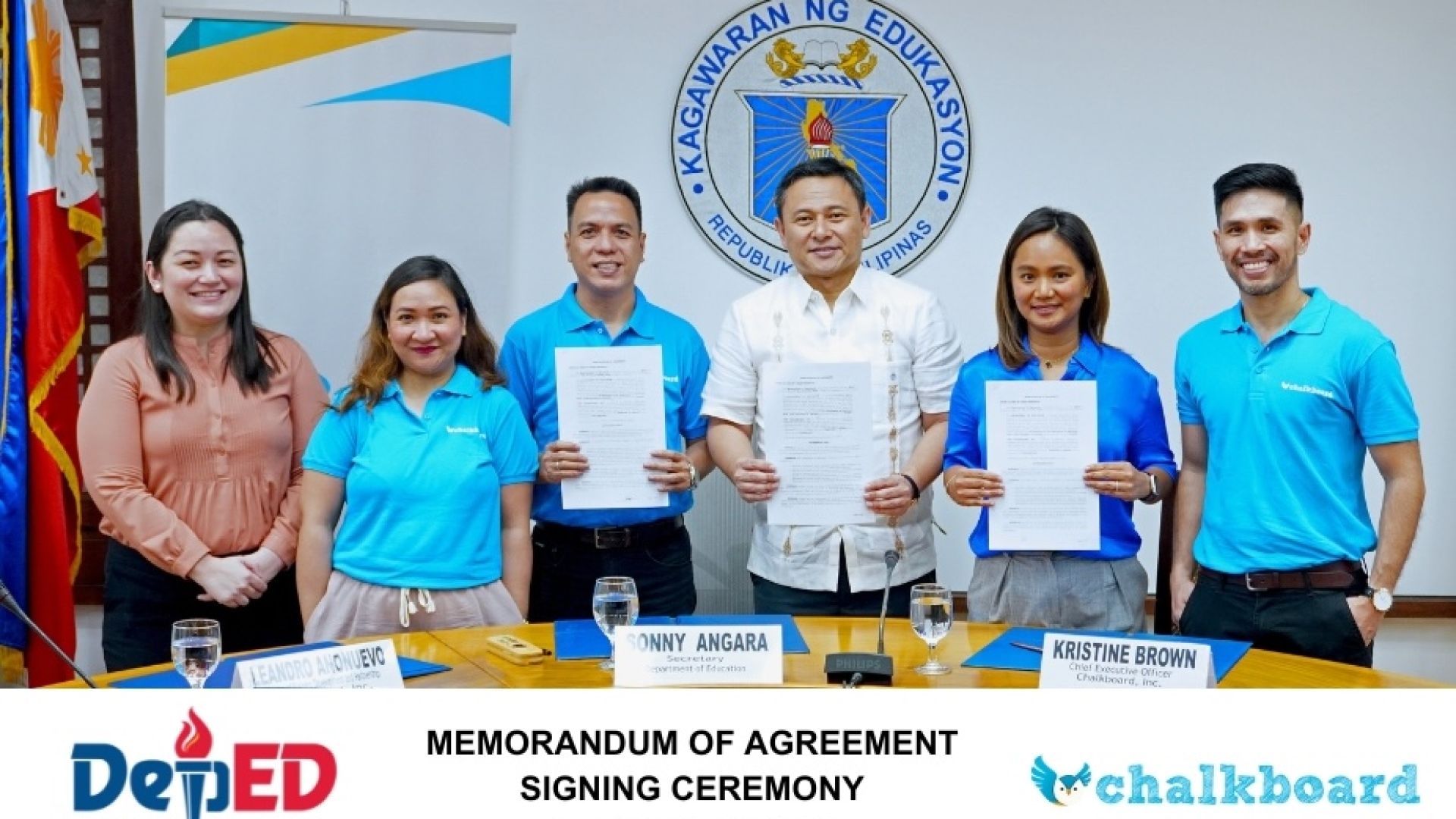In a landmark initiative aimed at enhancing the quality of education in the country, the Department of Education (DepEd) has entered into a formal partnership with Chalkboard, a leading provider of tutoring services, to launch the Academic Remediation, Acceleration, and Livelihood (ARAL) Program. This program seeks to address the pressing challenges in literacy and numeracy faced by Filipino students, particularly in public schools.
 The Department of Education taps Chalkboard’s community-based ARAL Program to help enhance literacy and numeracy skills among public school children. At the MOA signing ceremony were (L-R): Georgina Yang, DepEd Assistant Secretary; Sharon Santiago, Chalkboard Marketing Director; Leandro Añonuevo, Chalkboard Director of Business Development and Partnerships; Sonny Angara, DepEd Secretary; Kristine Brown, Chalkboard Chief Executive Officer; and Albert Tablan, Chalkboard Chief Operating Officer.
The Department of Education taps Chalkboard’s community-based ARAL Program to help enhance literacy and numeracy skills among public school children. At the MOA signing ceremony were (L-R): Georgina Yang, DepEd Assistant Secretary; Sharon Santiago, Chalkboard Marketing Director; Leandro Añonuevo, Chalkboard Director of Business Development and Partnerships; Sonny Angara, DepEd Secretary; Kristine Brown, Chalkboard Chief Executive Officer; and Albert Tablan, Chalkboard Chief Operating Officer.
The Memorandum of Agreement (MOA) was signed on October 14 at the DepEd Central Office in Pasig City by DepEd Secretary Sonny Angara and Chalkboard CEO Kristine E. Brown. This partnership brings together the strengths of both the public and private sectors to promote improved educational outcomes for K-10learners.
A Collaborative Effort for Quality Education
The ARAL Program embodies a synergistic collaboration between DepEd and Chalkboard, leveraging their combined expertise to ensure accessible, high-quality education for all Filipino learners. This partnership aligns with the government’s mandate to provide accessible, quality education as outlined in Republic Act 8525, otherwise known as the “Adopt-A-School Act of 1998,” which encourages private sector involvement in improving public education.
During the signing ceremony, DepEd Secretary SonnyAngara highlighted the importance of collaboration in achieving the department’s goals. “DepEd is committed to ensuring that quality education is accessible to all Filipino learners, and this partnership with Chalkboard is a significant step toward that goal. By working together with the private sector, we can improve the academic performance and overall well-being of our students,” he noted.
Comprehensive, Evidence-Based Curriculum Powered by Advanced Technology
At the heart of the ARAL Program lies Chalkboard’s evidence-based curriculum, meticulously designed to ensure effective learning outcomes. This curriculum is grounded in the latest educational research and best practices, ensuring that each component is proven to enhance literacy and numeracy skills. A key feature of this curriculum is its integration of advanced technology to process data and inform the progress of each student.
ARAL Program Structure and Implementation
The ARAL Program employs a comprehensive, evidence-based strategy to address learning deficits exacerbated by the COVID-19 pandemic. Developed by Chalkboard, the program offers up to 25 days of targeted tutoring over six weeks, delivered through both in-person and digital platforms. This high-frequency, intensive approach is supported by research demonstrating substantial improvements in literacy and numeracy skills.
The program includes several key components:
•Personalized Learning: The tutoring sessions are tailored to meet the unique needs of each student, ensuring that every learner receives the appropriate support.
•Nutritional Support: Recognizing the connection between nutrition and learning, the ARAL Program will provide nutritious snacks or meals during each tutoring session to support students’ well-being.
•Community Upskilling and Engagement: The program involves local community members as paid tutors, creating economic opportunities while fostering a supportive educational environment.
•Holistic Development: In addition to academic support, the ARAL Program aims to develop students’ socio-emotional skills, preparing them for success both in and outside of the classroom.
Chalkboard has designed the program to be scalable and sustainable, ensuring it can be replicated in different regions and communities across the Philippines. “We believe that education is the key to unlocking the full potential of every child,” said Kristine E. Brown, CEO of Chalkboard. “The ARAL Program is our contribution to improving the educational landscape of the Philippines, particularly in addressing the learning gaps that have been exacerbated by recent challenges such as the pandemic.”

Target Beneficiaries and Community Impact
The primary beneficiaries of the ARAL Program are K-10 students in public schools, particularly those struggling with literacy and numeracy. The program’s implementation will begin with pilot schools, and its success will be measured through Chalkboard’s assessment system, supplemented by DepEd’s assessment tools.
The program not only benefits students but also the wider community. Local community members will be engaged as paid tutors or food vendors, providing them with meaningful employment opportunities while contributing to the educational success of the students.
DepEd will coordinate closely with Chalkboard to select target areas and ensure smooth program implementation. Monitoring and evaluation will be conducted throughout the program’s two-year duration to ensure that it delivers tangible and verifiable results.
A Model for Future Educational Partnerships
The ARAL Program will be funded through partnerships with private sponsors, local government units, and other supporting entities. With the support of these stakeholders, the program aims to create a lasting positive impact on the academic performance and socio-emotional development of Filipino students.
This collaboration between DepEd and Chalkboard is seen as a model for future public-private partnerships in education. Both parties are optimistic that the ARAL Program will not only help bridge current learning gaps but also lay the foundation for long-term educational improvements in the country.




